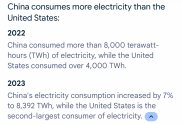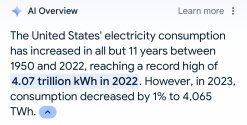All countries would care about NGDP regardless of their current account but the main purpose of the reply was just showing why the NGDP growth claim is trueWhy would a net exporting nation care about nominal GDP.
You are using an out of date browser. It may not display this or other websites correctly.
You should upgrade or use an alternative browser.
You should upgrade or use an alternative browser.
Chinese Economics Thread
- Thread starter Norfolk
- Start date
They aren’t comparable given the different denominators but the key word there was nominal
1) Real GDP difference from nominal GDP is just taking inflation into account. It not a separate accounting method like PPP. There is nothing that shows the US outgrowing China in the last qtr.
2) Nominal GDP as based on US dollars is absolutely not comparable in comparing China's GDP with the US one.
Look at the growth of electricity use in China versus the US.
A. China uses twice as much electricity as the US signifying a far larger real economy. In fact, the difference is far greater than even the PPP GDP calculations. So nominal already paints a false picture here. BUT even worse ...
B. China's usage of electricity in 2023 grew 7% while the US usage of electricity shrank
1%.*
So we have from you the idiocy of an economy with surging electricity usage (China) is said to be losing ground to an economy (US) that had contracting electricity usage.
Sorry, there is no way a modern economy that is expanding 7% in electricity usage is growing less than an economy with a shrinking usage of electricity.
*


It doesn't change that China both have larger absolute and percentage growth by a lot, whether you count it in RMB or convert to dollar.They aren’t comparable given the different denominators but the key word there was nominal
Imho urbanisation will only go up by 10-20% more at most. They still need a lot of farmers if nothing then for national security reasons.China is still not as urbanized as other advanced economies. With an urbanization rate of like 60% there is a long way to go. So while the real estate sector is currently undergoing a downturn it is unlikely this will last more than 5 years. Which is the typical amount of time it takes for property crashes to wind down. In 10 years the property market will be in a growth phase again.
20% of China's population is about the same number of people living in Indonesia and around 80% of the US population, it's definitely not an insignificant number.
How many farmers are actually needed? Gold standard for modern agriculture is the Netherlands, which currently has 2% of its population in agriculture, compared to ~25% in China.It doesn't change that China both have larger absolute and percentage growth by a lot, whether you count it in RMB or convert to dollar.
Imho urbanisation will only go up by 10-20% more at most. They still need a lot of farmers if nothing then for national security reasons.
Think this is an achievable number, but this will be way past 2050.
proelite
Junior Member
How many farmers are actually needed? Gold standard for modern agriculture is the Netherlands, which currently has 2% of its population in agriculture, compared to ~25% in China.
Think this is an achievable number, but this will be way past 2050.
Netherlands: 17.7 million
China: 1.41 billion
Not really. US manufacturing is deep and broad but not energy intensive. Manufacturing biologic drugs is far less energy intensive than manufacturing rebar. Electricity use is simply not a good proxy for value added manufacturing. And it’s an even worse proxy for other substantial value added sectors - Nvidia and Cadence don’t use much of any electricity, after all, they are going to be a few thousand of the worlds foremost experts working under excellent management teams from home, yet GPUs and EDA software is incredibly valuable - computer systems design and software publishing are, after all, servicesA. China uses twice as much electricity as the US signifying a far larger real economy. In fact, the difference is far greater than even the PPP GDP calculations. So nominal already paints a false picture here. BUT even worse ...
1. I didn’t raise the NGDP growth claim (although it’s true)So we have from you the idiocy of an economy with surging electricity usage (China) is said to be losing ground to an economy (US) that had contracting electricity usage.
2. US declines in electricity consumption reflect highly innovative advances that allow for the same amount of electricity to do more work.
No: this is quite easy to resolve. You have greater efficiency in electricity usage - particularly in the household sector with more efficient air conditioners and lighting.Sorry, there is no way a modern economy that is expanding 7% in electricity usage is growing less than an economy with a shrinking usage of electricity.
Electricity usage is a bad measure of economic size. So is nominal GDP. I don't know why people keep picking and choosing the metrics they use to fit their own biases and the points they are hoping to make. We already have YoY real GDP growth which is a sensible, apples-to-apples comparison showing the U.S. at 3.1% for Q2 while China is at 4.7%. This spread is smaller than it should be given the relative per capita GDP differences, and China is still growing faster than the U.S. These can both be true at the same time.
manqiangrexue
Brigadier
Except you imagined America's greater efficiency when China actually has the greater efficiency. Which means that the results skew even more in favor of China. From the American Council for an Energy-Efficient Economy:Not really. US manufacturing is deep and broad but not energy intensive. Manufacturing biologic drugs is far less energy intensive than manufacturing rebar. Electricity use is simply not a good proxy for value added manufacturing. And it’s an even worse proxy for other substantial value added sectors - Nvidia and Cadence don’t use much of any electricity, after all, they are going to be a few thousand of the worlds foremost experts working under excellent management teams from home, yet GPUs and EDA software is incredibly valuable - computer systems design and software publishing are, after all, services
1. I didn’t raise the NGDP growth claim (although it’s true)
2. US declines in electricity consumption reflect highly innovative advances that allow for the same amount of electricity to do more work.
No: this is quite easy to resolve. You have greater efficiency in electricity usage - particularly in the household sector with more efficient air conditioners and lighting.
"China tied for fourth with France, and ranked significantly higher than the United States for the second time, just behind the EU. China ranked first in building energy efficiency. Residential buildings consume less energy per square foot than those in any other country analyzed, and commercial buildings have the second lowest energy consumption per square foot."
"Across most metrics analyzed, the United States has made limited or little progress toward the goal of using energy more efficiently in recent years.
Overall, the United States did not move up and was ranked toward the bottom of the pack, 13th out of 16 countries.
In addition, since the last International Scorecard the United States has seen a drop in its investment in energy efficiency R&D."
Last edited:
You know this because? Do you know how much power server farms draw even idling? You think Nvidia and Cadence is just a bunch of coders with laptops? Please take your BS back to the American economics thread.Not really. US manufacturing is deep and broad but not energy intensive. Manufacturing biologic drugs is far less energy intensive than manufacturing rebar. Electricity use is simply not a good proxy for value added manufacturing. And it’s an even worse proxy for other substantial value added sectors - Nvidia and Cadence don’t use much of any electricity, after all, they are going to be a few thousand of the worlds foremost experts working under excellent management teams from home, yet GPUs and EDA software is incredibly valuable - computer systems design and software publishing are, after all, services
